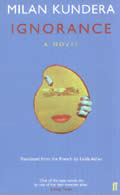Ignorance, by Milan Kundera, is a small novel but big on ideas. Playing like a watered down Odyssey, two Czech émigrés return to post-communist Prague after twenty years. A chance meeting in the airport stirs memories of long ago that leads to an interesting study of our memory, its limits and unreliability, and how, in our ignorance, we can take it for granted and trust it too much.
Irena fled to France during the Russian invasion; Josef to Denmark. Both have built new lives, made new friends, and forgotten who they were. After the fall of European communism in 1989, they return to their city only to find that it’s no longer theirs; it’s full of tourists, whores, and restaurants the Czechs can’t afford. A chance sighting in the airport causes Irena to engage Josef in conversation; she remembers him from a conversation twenty years ago. They agree to meet, and, as the novel builds up to their rendezvous, they go about their homecomings – meeting parents, friends, and, ultimately, themselves – to discover that Prague is no longer home.
Stylistically, the book is a dream. Although little happens in the novel – a conversation here, a wander there – it is the narrator’s asides that gels the experience, wandering off into philosophical mode, or giving atypical history lessons – all the time, maintaining a poetic tone. The prose is terse, but just right to create the surreal atmosphere it needs to succeed. It wanders effortlessly between the different characters and the lessons learned from their actions.
The characters are well drawn, although their focus is completely on their homecoming, their memory, and doubts about their patriotism. Their actions are believable; their conversations intelligent. Prague, as a character, is underdone – little of the city is given, and, after twenty years, it would have been nice to know the visible changes that time has wrought.
Overall, Kundera has provided an appealing novel, doubtless inspired by his own circumstances as a Czech émigré. While it may not be to the tastes of all (i.e. those seeking action) it does endow us with food for thought, something to consider about our memories. And, at least for me, the true thrill was watching how the philosophical and historical asides came together to complete the novel, and reinforce the characters’ feelings.
